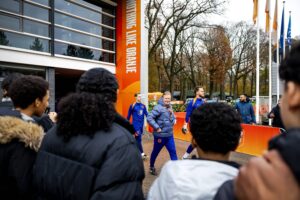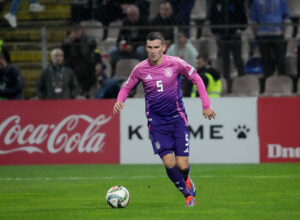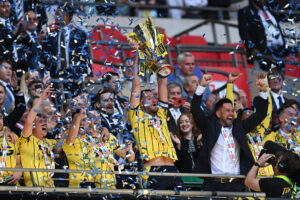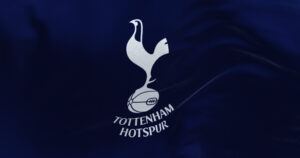It seems almost unthinkable that twenty years ago, Real Madrid had gone more than three decades without winning the European Cup. Since winning their sixth title in 1966, they had only reached one final, losing to Liverpool. The man who ended 32 years of hurt was Predrag Mijatović. The Yugoslavian striker scored the winning goal in the 1998 Champions League final against Juventus. It almost seems that his achievements at the Bernabéu are overshadowed by the Los Galácticos era of Zidane, Figo and Beckham.
Early Years
Predrag Mijatović was born in 1969 in Titograd, in the former Yugoslavia. He had spells with the youth teams of both major clubs in his hometown, OFK and Budućnost. Mijatović signed for the latter, and made his debut during the 1987-88 season.
He was soon selected to represent his country at the 1987 FIFA World Youth Championship in Chile. At the tournament, Yugoslavia showed exactly why they had the potential to become a dominant force in world football. They won all three of their group games before beating the holders Brazil in the quarter-final and East Germany in the semi-final. West Germany awaited them in the final, and following a 1-1 draw, Yugoslavia won the resulting penalty shootout. Mijatović showed his promise by scoring three times throughout the tournament.
He returned to Budućnost and became an integral part of the first team squad. Although not a prolific scorer at this point, Mijatović impressed many with his skill and technical ability. It didn’t take long for some of the Yugoslav First League’s bigger clubs to start paying attention. Hadjuk Split were close to signing the forward, but Partizan Belgrade stepped in with a bid of around £400,000. This was enough to see Mijatović make the move to the capital in the winter of 1989.
International Recognition
It was shortly before his move to Belgrade that Predrag Mijatović was called up to the Yugoslav national team. He made his debut in September 1989, playing 45 minutes of a friendly match against Greece. Unfortunately for the forward, the side was so strong that it would be almost two years before he won his second cap. With players such as Dejan Savićević, future club mate Davor Šuker and Darko Pančev ahead of him in the pecking order, Mijatović was not selected for the 1990 World Cup squad.
Despite scoring on his Partizan debut, against his former club Budućnost, Mijatović took a while to settle in Belgrade. It wasn’t until his second season that the fans began to see the best of their new striker. He began to score regularly, but their bitter rivals Red Star were completely dominant domestically, and went on to win the European Cup in 1991. Partian were nowhere near the title, and finished fourth and third in Mijatović’s first two seasons.
The 1991-92 season would be the final bow for the old Yugoslav First League, as the several states began to declare independence. While Red Star retained the league title, Partizan beat their city rivals in the Yugoslav Cup final. They won 3-2 on aggregate, with Mijatović scoring one of the goals in the second leg.
The new First League of FR Yugoslavia began in 1992-93, and by now Red Star’s squad had been picked apart by Europe’s big guns. Mijatović now had a new strike partner in the form of Savo Milošević, who would later play for Aston Villa. Partizan swept all before them to win the league title, finishing 14 points ahead of Red Star. It would also be Mijatović’s last season with Partizan, as several European clubs had been alerted to his talents. Despite interest from Juventus, it was Valencia who secured his services with a bid of £8.5 million in the summer of 1993.
Valencia
During his first two seasons at the Mestalla, Valencia recorded 7th and 10th place finishes, respectively. Mijatovic had proved to be an astute buy, but overshadowed by players such as Romário and Hristo Stoichkov. Johann Cruyff’s Barcelona “dream team” were seen by many as the strongest in Europe.
In 1995, what remained of the old Yugoslavia were readmitted into UEFA competition. By this time it was too late for them to be put in contention for qualification for Euro 96. Mijatović had only made 10 appearances for his country before, but made his debut, once again, in a friendly against Greece.
In 1995-96, Mijatović scored 28 league goals, which was exactly how many he had managed in his first two years at the club. This made him the second highest goalscorer in La Liga, behind Juan Antonio Pizzi of Tenerife. It was enough, however, to see him win the Don Balón Award for the best foreign player in Spain. Such form also saw Valencia narrowly miss out on the title, finishing in second place. Poor seasons by Barcelona (3rd place) and Real Madrid (6th), who amazingly didn’t even qualify for the UEFA Cup, saw Atlético win La Liga, four points ahead of Valencia.
When someone outside of the El Clásico clubs has a good season, they quite often end up moving to one of them. In this case, Pizzi moved to Barcelona and Mijatović joined Real Madrid for approximately £12 million in the summer of 1996.
Real Madrid
There was a buzz of expectancy around the Bernabéu prior to the 1996-97 season. Real Madrid had flexed their financial muscle, and brought a host of new signings to the club. Roberto Carlos and Clarence Seedorf were among them, but what really excited the fans was the strength they now had up front. Davor Šuker had been one of the best players on show at Euro 96, and he would partner Predrag Mijatović in attack, with Raúl playing just behind them. A poor season had cost manager Jorge Valdano his job, and he was replaced by future Engand boss Fabio Capello.
It promised to be an exciting title race as Barcelona had also strengthened their attacking options. Brazilian wonderkid Ronaldo had been brought in to partner Hristo Stoichkov, who had just returned from a season with Parma. They had also changed their manager, with the late Bobby Robson replacing Cruyff in the dugout.
Mijatović and Šuker made a fantastic partnership, and Raúl was equally effective as Madrid took charge in the race for La Liga. Going into the winter break they remained unbeaten, and had recorded a 2-0 win over Barcelona at the Bernabéu. This was a particularly emotional night for Mijatović, who scored one of the goals that night. As he was substituted late in the game, the Madrid fans chanted “Andreja”, the name of his son who was critically ill (he unfortunately passed away in 2009 at the age of 15).
Madrid finished the season as champions, two points ahead of their bitter rivals. Mijatović had scored 14 goals, but his unselfish style of play had provided many assists for Šuker and Raúl. As a result he finished second in the voting for the 1997 Ballon d’Or, just behind Ronaldo and ahead of Zidane. Despite winning La Liga, Capello was replaced by Tenerife manager Juup Heynckes.
The Holy Grail at Last
Given that Real Madrid have won the Champions League five times over the last two decades, it seems strange to think that they went more than thirty years without being crowned champions of Europe. But that is exactly how it was going into the 1997-98 season.
The season started brightly enough, as Real Madrid lifted the Supercopa de España beating Barcelona. Mijatović scored one of the goals in second leg, to help seal a 5-3 aggregate victory, but it would be a largely frustrating season for him. Madrid’s league form was in the doldrums, while Barcelona, now led by Louis van Gaal were showing the form that would see them finish as champions. The European campaign saved Real Madrid’s season, as they finished 4th in La Liga.
Having won a group that included Rosenborg, Olympiakos and Porto, Real Madrid proceeded to the knockout phase. They saw off the challenge of Bayer Leverkusen and holders Borussia Dortmund to proceed to face Juventus. Despite having lost to Dortmund in the previous years’ final, the Italians were seen by many as the best team in Europe at the time.
It had been a frustrating season for Mijatović, who had struggled for game time. This was partly due to the form of new signing Fernando Morientes, who had worked his way into the team. In the final, however, it was Davor Šuker who found himself on the bench, while Mijatović partnered Morientes up front.
Juventus’ line-up included players such as Zinedine Zidane, Edgar Davids and Alessandro Del Piero among their stars. With just over an hour played, Roberto Carlos took a shot into a crowded Juventus penalty area. The resulting deflection landed at the feet of Mijatović, who rounded Angelo Peruzzi and chipped the ball into an empty net. Despite a late onslaught from the Italians, and several misses from Filippo Inzaghi, Madrid held out. Their 32 year wait for the European Cup was over. In spite of this, Heynckes was replaced by Guus Hiddink a week later.
Adiós Madrid
Mijatović represented his country at the World Cup in France that summer, and much was expected. Although Yugoslavia had qualified via the play-offs, they had thumped Hungary 12-1 on aggregate. Over those two games, Mijatović scored seven goals and he was expected to be one of the stars of France 98. They had no trouble qualifying from the group stage, and Mijatović scored the opening goal of a 2-2 draw with Germany. Unfortunately they were eliminated in the first knockout round by Holland, thanks to a last minute winner by Edgar Davids.
Mijatović returned to Madrid for what would be his final season at the Bernabéu. Despite scoring the winning goal in the Champions League final, it was clear that Morientes and Raúl were now first choice strikers. Hiddink only lasted until February as manager, replaced by John Toshack for the rest of the season. They finished second in La Liga, and were replaced as European campions by Manchester United. After just five goals in the 1998-99 season after often being deployed out wide, he was sold to Italian side Fiorentina.
Serie A and Later Career
Fiorentina had been in contention for the Serie A title for much of the previous season. Although their challenge had eventually petered out, they finished third to qualify for the Champions League. Mijatović was seen as an ideal attacking option to partner the magnificent Gabriel Batistuta. Unfortunately they were unable to repeat the heroics of the previous season, and finished a disappointing 7th.
During his time in Florence, Mijatović had to compete against several other strikers for a place in the team. Even when Batistuta joined Roma in 2000, the likes of Enrico Chiesa, Abel Balbo and Nuno Gomes were still around. As a result, Mijatović was often deployed in midfield, as had also happened in Yugoslavia’s disappointing Euro 2000 campaign. By now, injuries began to take their toll and over a three year spell in Italy he made just 42 league appearances, scoring four goals. When Fiorentina won the Coppa Italia in 2001, Mijatović was an unused substitute for both legs of the final against Parma.
When Fiorentina were placed into administration in the summer of 2002, all of their players were given free transfers. Mijatović returned to Spain, joining Levante but further niggling injuries saw him make just 21 appearances in the final two years of his career. He retired in the summer of 2004.
Since hanging up his boots, Mijatović has remained involved in football. He became a player agent before a three year spell as director of football at Real Madrid.
Final Thought
Predrag Mijatović was a supremely talented player, whose later career was beset by several small injuries. It’s also fair to say he became a victim of his own versatility, which would often lead to him being played on the wings or in midfield, rather than in his favoured role up front.
Before Mijatović struck in Amsterdam, Real Madrid had waited 32 years to be crowned champions of Europe. Despite this, his name is never mentioned in the same breath as the “Galácticos”. But that one goal etched his name into Madrid folklore forever, and nobody can ever take that away from him.
For previous instalments in the series, click the links below.
Part 1: Dejan Savićević Part 2: Stefan Effenberg Part 3: Guiseppe Signori
Part 4: Miguel Ángel Nadal Part 5: Darko Pančev Part 6: Oliver Bierhoff
Part 7: Nuno Gomes Part 8: Mark Hateley Part 9: Andrei Kanchelskis
Part 10: Jari Litmanen Part 11: Gianluca Pagliuca
Main Photo






